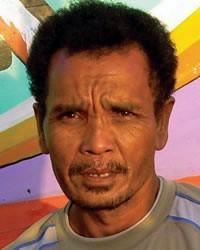Toli-Toli in Indonesia

Photo Source:
Copyrighted © 2026
Anonymous All rights reserved. Used with permission |
Send Joshua Project a map of this people group.
|
| People Name: | Toli-Toli |
| Country: | Indonesia |
| 10/40 Window: | Yes |
| Population: | 25,000 |
| World Population: | 25,000 |
| Primary Language: | Totoli |
| Primary Religion: | Islam |
| Christian Adherents: | 0.06 % |
| Evangelicals: | 0.04 % |
| Scripture: | Translation Started |
| Ministry Resources: | No |
| Jesus Film: | No |
| Audio Recordings: | No |
| People Cluster: | Kaili-Tomini of Sulawesi |
| Affinity Bloc: | Malay Peoples |
| Progress Level: |
|
Introduction / History
The Toli-Toli are also known as Tontoli, Totoli, or Gage. They live in the districts of North Toli-Toli, Galang, Baolan and Dondo in the Toli Toli regency of Central Sulawesi province. The Toli-Toli area has steep rolling hills along the coast. Toli-Toli is derived from the word totolu meaning three. According to folklore, the Toli-Toli derived from three persons who incarnated from heaven to earth through olisan bulan (golden bamboo), bumbung lanjat (peak tree of Langsat) and ue saka (similar to rattan). Olisan bulan incarnated is known as Tau Dei Baolan or Tamadika Baolan. Ue saka incarnated is known as Tau Dei Galang or Tamadika Dei Galang. A princess who incarnated as bumbung lanjat is known as Buki Bulan. The Toli Toli language is more closely related to the Boano language. It is related to Tomini group of languages (Dampelas, Dondo, Lauje, Tomini, Balaesang, Pendau, Taje and Tajio).
What Are Their Lives Like?
Toli-Toli villages are small and comprised of houses on stilts. Toli-Toli living on the coast are often fishermen, while those in the hills typically cultivate rice in unirrigated fields, as well as corn and sago. The Toli-Toli process high quality spices such as cloves, as well as copra and cocoa. Because of the many coastal areas, Toli-Toli areas are rich in marine products as fish, seaweed, etc. Currently, the government is in the process of doing international trade with East Kalimantan province, Malaysia and Philippines that is known as Totata (Toli-Toli - Tarakan - Tawau) and Tosamin (Toli Toli - Sabah - Mindanao). These are expected to bring many work and business opportunities. In an earlier era, the Toli-Toli people were governed by a sultan. Each clan was led by a head man who was chosen along ancestral lines. Because of that, social classes developed among the people. The four classes are: royalty, nobility, common people and slaves. In the Toli-Toli area, the development of transportation facilities by land, air and sea tends to be slow. Adequate transportation facilities are needed to support smooth distribution of their abundant crops.
What Are Their Beliefs?
The Toli-Toli people are Sunni Islam; however, many do not strictly follow the teachings of Islam. In the more isolated locations, many of the Toli-Toli still hold to their local ancient religion of animism. They believe that inanimate things are indwelt by spirits. Many Toli-Toli mix worship of nature and their ancestors with Islam.
What Are Their Needs?
Better education in schools and better vocational training would help improve the employment opportunities of the Toli-Toli young people. The people as a whole need improved infrastructure to market their produce and increase trade, to fully participate in the national and international economies. There are several very beautiful sites which still could be developed, namely the beaches of Lalos, Sabang, Tende, Bajungan and Kolondom; along with underwater tourism of pristine coral reefs, as well as various islands that are very suitable for resorts.
Prayer Points
Pray for a spiritual hunger that will open their hearts to the King of kings.
Pray for the Lord to send out loving workers to the Toli Toli people.
Pray for Toli Toli disciples who will not rest until they make more disciples.